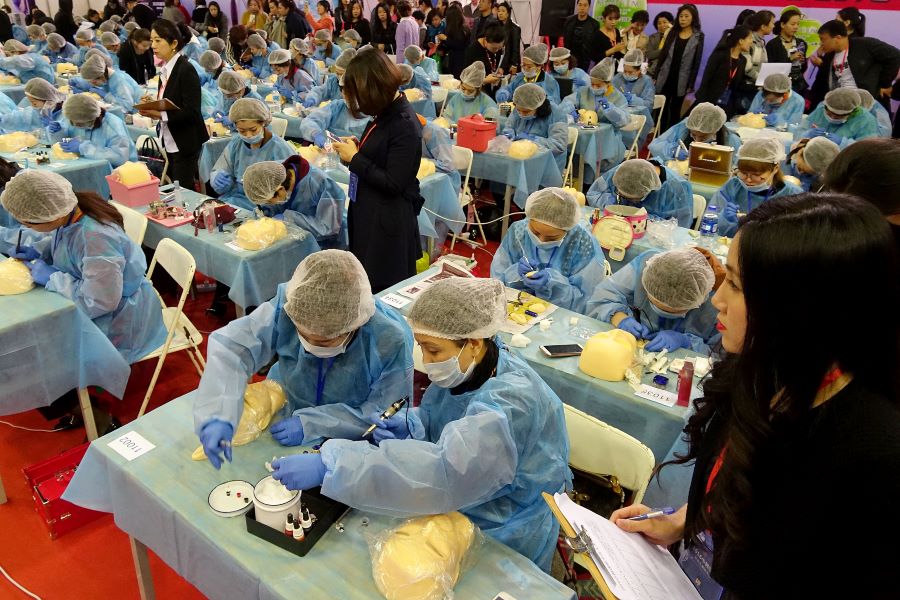Regulatory Wrinkles Spoil So-Young’s Latest Results

Despite posting solid second-quarter growth, cosmetic surgery platform spends much of its earnings call trying to ease investor concerns over a regulatory crackdown
Key takeaways:
- So-Young International devotes much of its second-quarter results trying to ease investor concerns over a potential crackdown on China’s cosmetic surgery industry
- Company’s revenue rises 37% and profit jumps sharply in latest quarter as business rebounds from year-ago pandemic-induced slowdown
By Doug Young
The superficial story in the latest results for plastic surgery platform operator So-Young International Inc. (SY.US) was strong growth for top-line revenue and even stronger gains for bottom-line profits in the three months through June.
But the much-bigger story was one that has dogged many of China’s fastest-growing emerging sectors since the middle of the year, namely the prospect of a looming regulatory crackdown. The broader series of crackdowns actually dates back to late last year with the spectacular 11th hour collapse of what was set to be a blockbuster IPO by fintech behemoth Ant Group.
Since then the crackdown has spread into much of the internet space over data security concerns, since most internet companies possess large volumes of sensitive user data. A separate crackdown has also enveloped the education sector, where regulators are severely restricting after-school tutoring services in a bid to ease pressure on young Chinese students.
The high-profile nature of those regulatory clampdowns has meant that a similar looming campaign against cosmetic surgery companies has gotten far less attention. In this case that’s at least partly because regulators haven’t taken decisive action against the group just yet, except to issue “guidelines” earlier this year calling for the elimination of deceptive advertising.
But the subtext is obvious: Such signals often mean more forceful action is on the horizon. The question isn’t if, but when, it will come.
“On the regulatory front, over the past few months regulatory authorities have expressed their views and opinions on various matters such as antitrust, data security and medical aesthetics advertising and issued a series of policies and guidance for multiple industries,” So-Young co-founder and CEO Jin Xing said on the company’s conference call to discuss its results released on Friday.
“We have taken this opportunity to reflect on our practice and our role as an industry leader and engage in self-reflection and introspection,” he added, using language that has become increasingly common from companies caught up in the various clampdowns.
Two camps have begun to emerge in terms of thinking about the latest cleanups, which seem too broad and spread across a wide array of industries to be simply coincidental. One says the central government is trying to flex its muscle and show everyone who is boss.
But a more recently emerging school, which has been reinforced by some newspaper commentaries, says the government is simply trying to clean up industries that were allowed to grow unchecked for years. Such sectors, that view says, are suffering from widespread issues involving lack of standards and other poor business practices that make them more vulnerable to risk and undermine public confidence.
If the latter view is really the case, then companies like So-Young certainly look set to benefit over the longer term due to their larger size and relatively better standards. But while they could be better positioned over the longer term, nearly everyone – even the better-run companies – is likely to suffer over the shorter term as all companies feel the sting of tighter regulation.
Non-Surgical Procedures
Recent media reports have spotlighted the unruly state of the cosmetic surgery sector, which was already suffering image problems due to its focus on the relatively superficial issue of improving one’s looks. A February report by the Global Times, a unit of the official Communist Party newspaper the People’s Daily, highlighted the huge number of unqualified companies operating in the space, saying China had more than 60,000 unqualified plastic surgery clinics in 2019.
Responding to the potential for disruption from a clampdown on the surgical part of the industry, So-Young used its latest quarterly report to emphasize the importance of information services and non-surgical procedures in its business mix.
The company pointed out that revenue from information services rose 54% in the second quarter to 360.7 million yuan ($56 million), accounting for 80% of its total revenue that grew at a slower 37.7% year-on-year during the period. The rest of the company’s revenue came from reservation booking services, which actually shrank 2.8% as the cosmetic surgery companies that use So-Young’s platform grew more cautious with their spending.
Jin pointed out that within its broader business mix, non-surgical procedures made up 70% of its total online reservation orders, again emphasizing that less controversial part of its business. He noted particularly strong growth for dental services, with the number of users reserving dental treatments over So-Young’s platform more than doubling and the number of professional dental institutions more than tripling from a year earlier.
The strong revenue growth, combined with cost controls that saw operating expenses rise just 16.7% during the quarter, helped the company post a huge jump in profit to 57.6 million yuan in the latest quarter, up from just 2.1 million yuan a year earlier when the pandemic had a far bigger impact.
The company predicted its third-quarter revenue growth would slow somewhat to around 23%, though that’s probably to be expected since business was already rebounding in the year-ago third quarter as China brought its pandemic under control.
The strong performance, coupled with relatively reassuring words from company management in an earnings call that was dominated by questions about regulation, helped So-Young’s shares to post a modest 2.7% gain on Friday after the results came out. But at its latest close of $5.33, the stock has lost about half of its value since late June when the regulatory clampdown began to accelerate.
The stock was actually even higher early in the year, trading above $16 in February on big hopes that it could emerge as a consolidator for a highly fragmented industry with big growth potential.
In terms of valuation, So-Young trades at a relatively low price-to-earnings (PE) ratio of 14 based on analyst profit forecasts for this year. The larger InMode, which develops technology often used in cosmetic surgery, trades at a far higher PE of 41 on a similar basis.
It’s quite possible So-Young could ultimately bounce back once the uncertainty lifts and it becomes clear the regulatory clampdown won’t intensify. But that’s by no means guaranteed, despite the company’s attempts to reassure investors and focus attention on its less controversial products and services in its business mix.
To subscribe to Bamboo Works free weekly newsletter, click here






